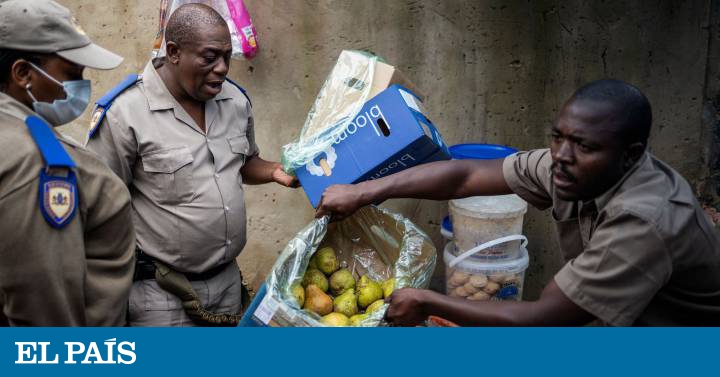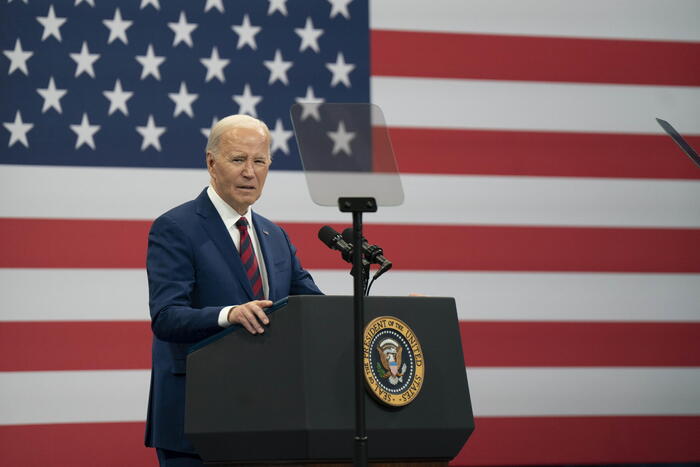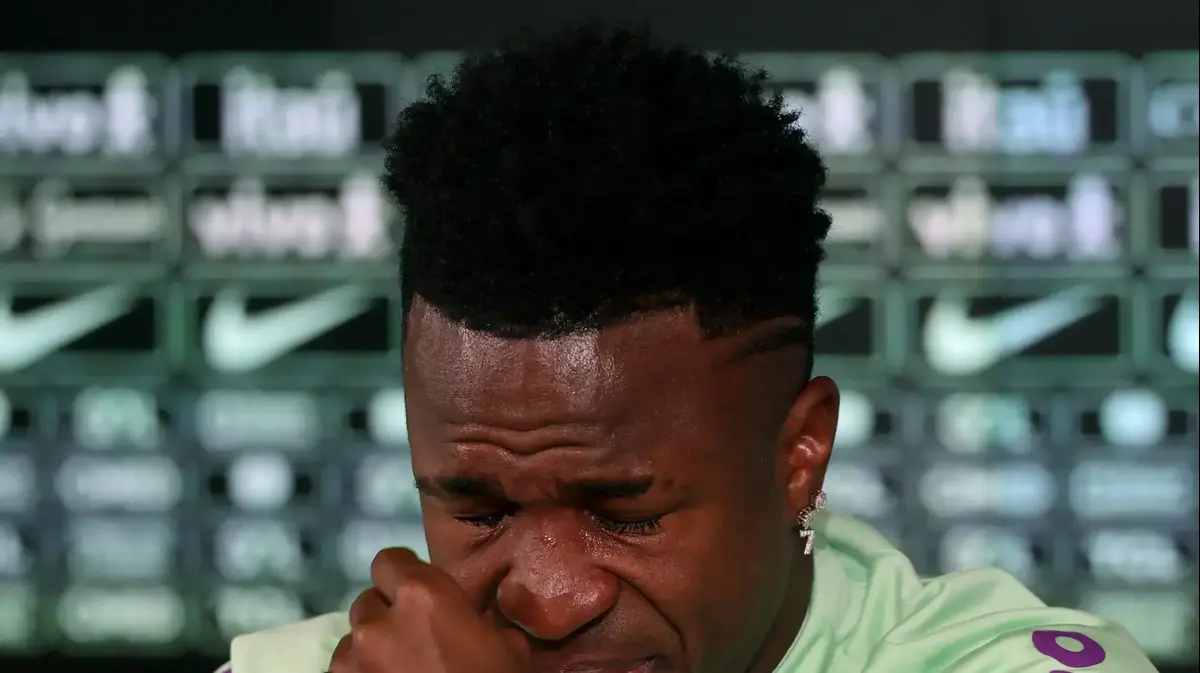In this delicate food chain, a single interruption can pose a problem for any of its components. And now, the COVID-19 epidemic, which already affects 53 countries on the continent where more than 10,000 cases have been reported, threatens to dismantle it from top to bottom: the restrictions that are applied worldwide to contain it, such as the closure of Borders, air and sea traffic and periods of confinement, can threaten the food security of millions of people if mismanaged.
MORE INFORMATION
PHOTO GALLERIES Without work and without food overnight- Latest news from the coronavirus in Africa
- Pandemic and poverty: Africa's terrifying double challenge
"We are concerned about the impact of COVID-19 on vulnerable countries that are fighting hunger, especially those affected by conflict or insecurity, such as those in the Sahel, and others in East Africa now experiencing the desert locust outbreak. But it is difficult to know what effects will be seen, "summarizes Heléne Pasquiere, head of food security at Action Against Hunger (ACH). The essential thing is to maintain food supplies and access for all, "because at the end of a health crisis we can face another food crisis," he warns.
Pasquiere is not the only one with this fear. A good number of organizations and experts in health and food have already warned that the impact of the epidemic can pose a problem in world food security. In developing countries, more, because these are the highest percentage of people with some form of malnutrition and malnutrition. Africa, in particular, has more than 256 million hungry, according to the latest United Nations count. Malnourished people, whether acute or chronic, have a weaker immune system, so they have fewer weapons to prevent the spread of the virus. Once they have been infected, it is possible that they suffer from severe symptoms, something that has already been proven to occur with Ebola patients: their previous nutritional status conditioned their evolution.
But, while the stereotypical image of Africa is that of a continent of starvation, the data says that overweight and obese people are found in higher percentages in developing countries, and there are a good number of them on this continent. People who earn little money do not buy healthy food, but many ultra processed foods that are cheaper and easier to find. In Africa, the situation is exacerbated in the thousands of impoverished neighborhoods in urban settings, such as Kibera, in Kenya, or Khayelitsa, in South Africa. "It is very likely that, if people do not have an income, instead of buying higher quality food, they will buy others that are low cost and nutritionally less suitable," confirms Pasquiere.
This population group also faces higher risks if they suffer from Covid-19, according to data collected in the United Kingdom. For starters, your immune system is chronically activated to respond to cellular damage caused by inflammation. Then, the obese also have more difficulty dealing with pneumonia, since excess weight sometimes compromises the ability of the lungs to take in oxygen; Furthermore, they are more likely to have poor cardiovascular health, and in many cases they are also physically inactive; all this compromises the immune system.
"The Covid-19 crisis adds to the problems we already had," laments Lola Castro, regional coordinator of the World Food Program in southern Africa, to illustrate the state of affairs in this area of the continent. "Here we are extremely affected by climate change; in the last three years we have had in at least eight countries very intense droughts that have destroyed not only crops, but in Namibia, Botswana and Angola have precipitated animal mortality and created a an unprecedented situation of food insecurity for people who were more or less well before and could feed themselves, "he describes. In this region alone, WFP has requested $ 450 million to ensure the food of those who already depended on them before the coronavirus for the next three months. Not everyone was helped because it was not reached, and now they will be more if the crisis continues. "We are trying, first of all, to maintain the activities that we were already carrying out. We need to do it on time because, if we wait, it can be a disaster," warns Castro, recalling that WFP has been the first to declare the global food emergency for the first time. time in its history. "It takes $ 1.9 billion to respond to this alert worldwide," he adds.
Day-to-day workers in the informal sector, especially in the urban context, have run out of sources of income
Many states have closed their borders and this also brings complications, according to Abebe Haile-Gabriel, deputy director-general of the UN Food and Agriculture Agency (FAO) and regional representative for Africa. His organization estimates that one in five calories that people consume has crossed at least one international border, more than 50% than 40 years ago. "Most countries depend on imports. In small island developing states, for example, up to 80% of their food comes from other regions, but it is not just them." And the same goes for exports: "Africans export primary products such as cocoa, oil, minerals, coffee ... Demand is falling, so incomes will decline and further undermine the ability to get food even if they are available. "he predicts. It must be borne in mind that in poor households in developing countries the population spends between 60% and 80% of their income on food.
Price increases are a reality in quarantined countries like Rwanda, where the cost of goods has increased significantly since closing due to a lack of carriers. Also in South Africa, with 30% unemployment and an economy that is highly dependent on tourism now non-existent. There, more than 300 complaints have been registered with the Consumer Commission regarding the increase in prices of basic necessities such as toilet paper, medicines and masks.
Bad in the country, worse in the city
Day-to-day workers in the informal sector, especially in urban settings, have been left without sources of income. "The transmission of COVID-19 must be reduced with infection prevention and control, but these people must also be supported so that they can cover their immediate basic needs, such as food, but also rent. Because if not people he will find himself on the street from one day to the next ", warns Pasquiere.
In Zimbabwe, for example, in the city of Harare, WFP has been making money transfers for several months due to the food crisis exacerbated by the economic crisis and a prolonged drought. Pure and hard food is distributed in rural areas. "If local markets work, we prefer to give money transfers that allow people to have a minimum basic basket, and we also promote local production. But in this case the food does not reach the markets and what is available has an unbearable price due to inflation, "Castro describes.
In the smallest and most remote villages in Africa, where the paved roads do not go and everything happens later, even the bad news, they may feel a little more protected than in a suburb. While the transporter and wholesaler who distributed and bought the potatoes are left without business and without income, there are those who will think that our imaginary Bakoro farmer can always eat his own potatoes, even if he only feeds on them for a time, or exchange them for onions with the next door neighbor.
It is urgent that governments immediately provide financial aid to those who have lost their livelihood
But people living in rural areas in many cases continue to have very strong ties to cities and restrictions on movement affect them in consumption, but also in production. About 60% of the African population is engaged in agriculture and in many countries, the main planting season begins now, which means that they have to get seeds, fertilizers and other inputs. "If the commercial market is interrupted, these inputs will not arrive on time, and if the planting season is lost, then there will not be enough harvest and that would aggravate the problem again, particularly nutrition," explains Haile-Gabriel.
Another difficulty that the ACH aid worker brings to the table is that in Africa many families depend on remittances from migration from other countries, generally Europe, where the crisis is also having an impact, and shipments are being reduced.
Equally concerned are residents in refugee and IDP camps, who were already having a difficult time eating. Pasquiere warns that food distribution will continue depending on the restrictions that governments impose on the movement of aid organizations, something that in principle is not happening.
In search of urgent solutions
For Lola Castro, it is urgent that governments immediately provide economic aid to all the people who have been left without work and without means of support. "Africa is very different from Europe and locking people at home for many days is very difficult. There are many who say 'I am going to starve to death rather than coronavirus because I do not have the money to buy my basic basket," he illustrates.
Thus, in South Africa, President Cyril Ramaphosa has announced a series of measures to help affected small businesses and workers including an unemployment benefit for informal workers and tax exemptions. In Namibia, those who have lost their income after the quarantine period will receive a grant of 750 Namibian dollars, about 37 euros. "I am concerned about countries like Malawi, Zimbabwe, Mozambique ... The situation is not so buoyant that the government can give subsidies immediately," says Castro, who also supports the participation of the private sector to weather the storm.
Another measure that, yes, already works, has been the opening of a humanitarian corridor in the south of the continent. "We made a request to the government and it has kept the port of Durban [South Africa] open, so we are unloading containers of specific nutritional food for children, corn flour ... And the carriers are being able to cross the borders. We are asking the governments of all the countries that do not close for urgent food aid, "says Castro.
During the telephone interview with this newspaper, the FAO deputy director, Haile-Gabriel, warns that in half an hour he will participate in another video call with members of the African Union and several ministers of Agriculture. The idea is to propose urgent recommendations to face the problem. "It is deafening the silence on the food crisis that hangs over our heads as a result of measures to contain the virus; in Africa we should speak about it without diluting efforts to contain the spread of the pandemic," he says before saying goodbye.
Reinventing aid delivery
LH
Lola Castro, regional director of the World Food Program in southern Africa, says that the COVID-19 pandemic has created an unprecedented situation. "We look for solutions as problems arise," he acknowledges. And one of the first they found is that they had to find the way to distribute the aid following the new indications of social distancing, hygiene, etc. "We can no longer have many people in one place, we have to make sure that people do not touch each other and that we can safely distribute food for both beneficiaries and humanitarian personnel."
"Before you could have two or three thousand people in a food distribution; now each group is 150 or 200 people at most. We also have infrared thermometers to evaluate everyone who comes. If someone has a very high temperature, they are sent to the health centers run by the ministries and the WHO. The people who wait do so in separate groups and go one by one to the distribution, collect the food without physical contact and then, as we have a biometric card to identify the beneficiaries , we have managed to unlink the biometric from the fingerprint, so now they only have to put the card near a machine that registers the data and they do not have to put the fingerprint, so there is no contact either, "sums up Castro.
You can follow PLANETA FUTURO on Twitter and Facebook and Instagram, and subscribe here to our newsletter.















